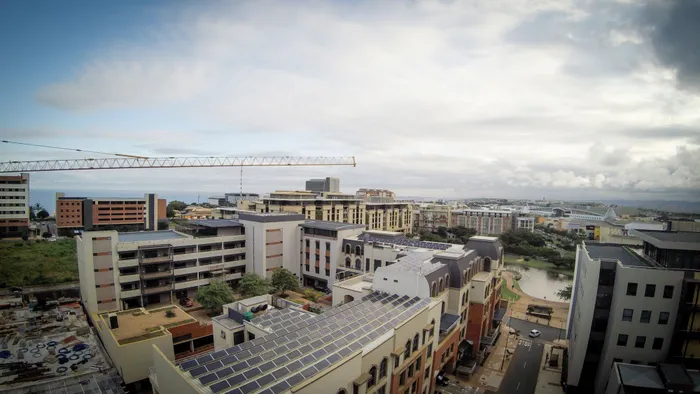Navigating South Africa's commercial real estate amidst political and global challenges
PROPERTY

Between March 2017 and March 2020, SA REITs lost more than 70% of their value, and while it had clawed back nearly 68% in value excluding dividends, it remained 50% below March 2017 levels.
Image: Supplied
The commercial real estate sector in South Africa is being tested by a mix of local political uncertainty and mounting global trade pressure, but the market is holding up with investors adopting a wait-and-see approach.
Earlier this month, the rand approached a historic low of R19.93 against the US dollar before recovering to R18.97 by April 14. Simultaneously, the JSE All Share Index saw significant volatility, dropping from 89 950.79 on March 31 to 82 485.81 on April 9, before rebounding to 88 162.30 by April 14.
Meanwhile, the FTSE/JSE listed Property Index was down by only 1.34% year-to-date on Tuesday, while it was up 21.93% over a 12-month period. Over three months it was up 0.55%.
The catalyst for the currency and volatility on the JSE? A 31% reciprocal trade tariff from the US (effective April 9), that's sent shockwaves across emerging markets. It's a sharp departure from South Africa's average 7.6% tariff and effectively sidelines the benefits previously granted to Sub-Saharan African economies under AGOA (African Growth and Opportunity Act).
"South Africa's commercial real estate market has been through its fair share of storms. It's proven resilient, especially in the face of structural constraints. Yes, short-term volatility might slow certain deals or make tenants a bit more cautious, but the fundamentals are there—particularly in logistics, repurposed office space, and tourism-driven assets,” said Galetti Corporate Real Estate CEO John Jack in a statement.
The local commercial real estate market came back strongly in late 2024, vacancies fell, net operating incomes improved, and there was an uptick in investor appetite. This was helped by rate cuts, easing inflation, more consistent energy supply, and the formation of the GNU.
“Not everyone is pulling their capital offshore; many investors are now simply re-evaluating—and that creates opportunity,” he said.
“South Africa kicked off 2025 on a high note, driven by lower interest rates, a stronger rand, reduced loadshedding, and a boost in investor confidence. By mid-January, we saw solid traction, especially in the resources sector, which bolstered activity on the JSE. Fast-forward to now and we're seeing capital flow back into safe havens as risk-off behaviour takes hold,” he said.
"In periods like this, the smart money tends to chase yield and stability—and that's exactly what the right property assets offer. They're long-term, income-generating and tend to outperform when the broader market feels uncertain,” he said.
The SA Reit Association’s online publication said improving fundamentals in South Africa continue to point towards a return to net property income and dividend growth for the sector over the next 2 to 3 years, and the sector is better positioned to weather uncertainty that lies ahead.
Jack said South Africa's real estate market continues to offer compelling yields—particularly in sectors with tight fundamentals. Bricks-and-mortar assets offered predictability and protection, and the sector was increasingly being seen as a strategic hedge.
The association said SA REITs (real estate investment trusts) had rebounded 68% since the Covid-19 crash, and properties were still trading at significant discounts to net asset value, with many offering long-term upside despite short-term global market volatility.
Between March 2017 and March 2020, SA REITs lost more than 70% of their value, and while they had rebounded by nearly 68% in value, they remained 50% below March 2017 levels.
The association said the improved local property income and dividend guidance from REITs like Growthpoint, Resilient, and Hyprop signalled a sector in recovery. Most also reported improved trading conditions.
The association said significant discounts to net asset value, unlike the premium conditions seen at the end of 2017, strengthened balance sheets, asset recycling, and timely equity raises had helped to bring down loan-to-values in the sector, making a repeat of the sell-down between 2017 and 2020 much less likely.
However, short-term volatility was likely to persist, particularly as global headlines are dominated by geopolitical tensions and trade disputes.
BUSINESS REPORT